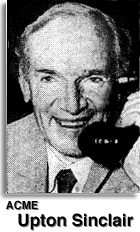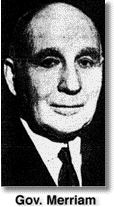|
||||
|
||||
|
|||||||||||||||||||

 Governor Merriam is
calling on his supporters to fight against "radicalism and Socialism."
Governor Merriam is
calling on his supporters to fight against "radicalism and Socialism."
"There is no other issue before us," he says.
He dismisses Mr. Sinclair's End Poverty in California proposals as "flimsy
and unreal... utterly misguided... completely impossible of realization...
dangerously unsafe and destructive." The Sinclair program, says Governor
Merriam, "contemplates a new and burdensome superstructure of taxation
upon a people already hard-
Mr. Sinclair, he adds, has made promises which he can not carry out if
elected, "but the mere attempt to put into practice many of the theories and
untried proposals advanced by radical and Socialistic propagandists will
add to our already heavy deficit in State finances and will invite bankruptcy
for many of California's important industries.
He points pridefully to the special session of the California Legislature
which he called and through which he forced measures dealing with old-
Out of California last week came a scary story which some of Mr.
Merriam's supporters called grave and important and some of Mr.
Sinclair's supporters called a silly bogey raised for political purposes.
It told of an alleged flight of capital from California, which was supposed
to be attributable to Mr. Sinclair's candidacy and to be reflected in a
declining price for California securities, notably State, county, and city
bonds.
Adding still another voice to the loud California chorus, George Creel, Mr.
Sinclair's unsuccessful opponent for the nomination, denied that the
Democratic State platform on which the latter is running embodies his
EPIC PLAN. "Instead of being a Sinclair platform, our State platform is
one upon which any Democrat can stand," Mr. Creel declared last week.
Sinclairism -- the program of Upton Sinclair and his radical associates
-- is Communism, cleverly disguised, but deliberately designed to
Russianize California state government.
Its rooted in class hatred, fostered and fomented by radicals who boast of
their hatred of American ideals and American principles of government.
IF IT IS SUCCESSFUL, IT WILL DESTROY CALIFORNIA'S
BUSINESS STRUCTURE, BANKRUPT OUR FAMILIES, OVERTHROW
OUR ORGANIZED LABOR, CONFISCATE OUR HOMES, WRECK
OUR INDUSTRIES, AND ROB OUR EMPLOYED WORKERS OF
THEIR EMPLOYMENT.
Your personal security is at issue -- the welfare of your home and family;
your American citizenship, your rights of self-rule and freedom of
worship -- your job and your independence.
AND REPUDIATE EVERY CANDIDATE WHO
Stamp Out Sinclairism and
Upton
Sinclair - The Radical Years
The Literary Digest
October 13, 1934
Advertisement for the California League Against Sinclairism,
formed by business groups when Upton Sinclair ran for California
governor. It was an ugly, emotional, red-
POLITICAL ADVERTISEMENT
A Challenge to Action!
A Call to Arms!!
In Defense of
DEFEAT UPTON SINCLAIR
CARRIES THE
STAMP OF SINCLAIRISM!
Communism in California
CALIFORNIA LEAGUE AGAINST SINCLAIRISM
Harold J. Boyd, Chairman
Charles H. Cunningham, Secretary2810 Russ Building, San Francisco
For more about Upton Sinclair, read:
The
Jungle - 1906
The
Consequences of Land Speculation... .1924
Hollywood
Fights the Red Peril (in French)